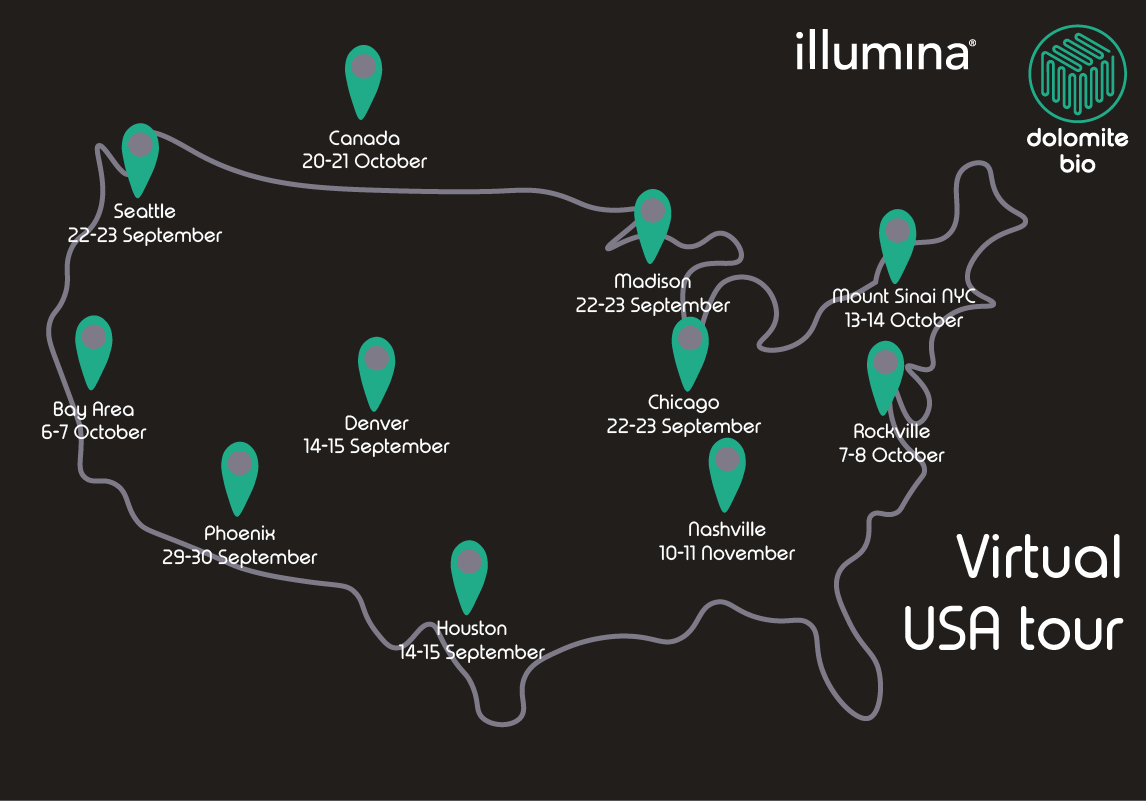Highlights from Illumina’s Single-Cell Sequencing Virtual Symposia
In the middle of September, we embarked on a tour of the US and Canada, with Illumina’s Single-Cell Sequencing Symposia (full list of events here). Albeit virtual, the symposia led us across the US from the West Coast with the Bay Area symposium, to the East Coast with the Rockville symposium and all the way up to Canada.
Most members of our Applications and R&D teams were lucky enough to join at various locations throughout this series of meetings and enjoy a selection of the talks presented. The conference had an excellent array of speakers, with talks from some of the well-known names in the single cell community, including Luciano G. Martelotto and Julie Siegenthaler. Some of the hot topics during these meetings were centered around single cell multi-omics methods and sample multiplexing technologies.
Dolomite Bio’s team highlights
Steven Hoffman, Single-Cell Sequencing Marketing Manager for Illumina, opened the event with a great overview on the single cell landscape. He gave insight into different single cell methods, multi-omics approaches, highlighting the pros and cons of each application.
This talk was nicely complemented by Luciano G. Martelotto’s (Scientific Director for the Single Cell Core at Harvard Medical School) presentation. He showed his top tips for single cell and single nucleus RNA sequencing, highlighting critical factors around sample accrual and storage as well as sample processing and sequencing.
Kimberly Aldinger, Senior Research Scientist at the Center for Integrative Brain Research, Seattle Children’s Research Institute, talked about the human cerebellum. Her group profiles the molecular, cellular and spatial composition of early and mid-gestational human cerebellum through scRNA-Seq to establish a ‘Developmental Cell Atlas of the Human Cerebellum’. Another cell atlas, of primary human breast cancers this time, was presented by Daniel Roden, Research Officer in the Cancer Division at the UNSW.
Andrew Adey, an Associate Professor at the Knight Cancer Institute who heads a research group focussed on the development and deployment of single-cell technologies, introduced a method of single cell combinatorial indexing called SciMAP-ATAC, a spatial ATAC-seq approach, for single cell combinatorial indexing Slide-seq. Another multi-omics approach was presented by Eleni Mimitou, Senior Research Scientist at the New York Genome Center. She talked about ECCITE-seq, a method for simultaneous scRNA-Seq, protein detection and cell hashing.
Chris McGinnis, PhD Candidate at UCSF, summarised new advances and applications of the MULTI-seq technology, focusing specifically on the development and benchmarking of the first multiplexing approach for scATAC-seq assays, MULTI-ATAC-seq.
Kory Lavine, Associate Professor at the Washington University School of Medicine in St Louis, looked at cardiovascular disease at single cell resolution to understand what happens on a cellular level in a recovering heart. He pointed out that a chosen sample preparation method can influence the interpretation of a sample’s cellular composition. He also highlighted that in his case single nucleus sequencing led to the detection of a greater breadth of cell populations than scRNA-Seq. This was likely due to the fact that larger cell types, such as cardiomyocytes, were excluded by the single cell system used in his lab. However, he reminded us that profiling nuclei can have the inherent disadvantage of increased frequency of doublets and ambient RNA.
There were a couple of interesting talks on new single cell data analysis tools. Raphael Gottardo, Director at the Fred Hutchinson Cancer Research Center, introduced a new algorithm, “FAUST”, for automatic classification/ annotation of cell clusters. Koen Van den Berge, from the University of California and Ghent introduce tradeSeq, a model framework that allows flexible inference interpretation of scRNA-Seq trajectories using differential expression and differential progression analysis.
Lastly, Jonah Cool, Program Officer for the Chan Zuckerberg Initiative talked about the support CZI gives to the single cell community. He presented the current initiatives and goals of the CZI as well as efforts that have already been funded such as Human Cell Atlas, Inflammation and tools like starfish and cellxgene.
During the event, Dolomite Bio launched their newest application on plant protoplast scRNA-Seq (ppRNA-Seq). With ppRNA-Seq, Dolomite Bio has now released a standardised application specific to the requirements of plant cells. Unlike many mammalian cell types, which dissociate from each other quite readily, plant tissues require intense enzymatic digestion and specific buffer conditions to be accessible for conventional single cell and microfluidic techniques. This application demonstrates that the Nadia Innovate and Nadia Instrument are capable of efficient and high-throughput encapsulation of plant leaf protoplasts in multiple buffers tailored to preserve plant protoplast integrity.
Finally, we would like to share with you our favorite quote from this symposia series:
 – Well said!
– Well said!
To find out more, or to download our newest application note, please visit our application page.
Further reading
Read our most recent blog with Dr Aki Minoda, discussing some of her recent research using Dolomite Bio’s Nadia platform
Or read our researcher spotlight with Dr Emanuel Wyler.

